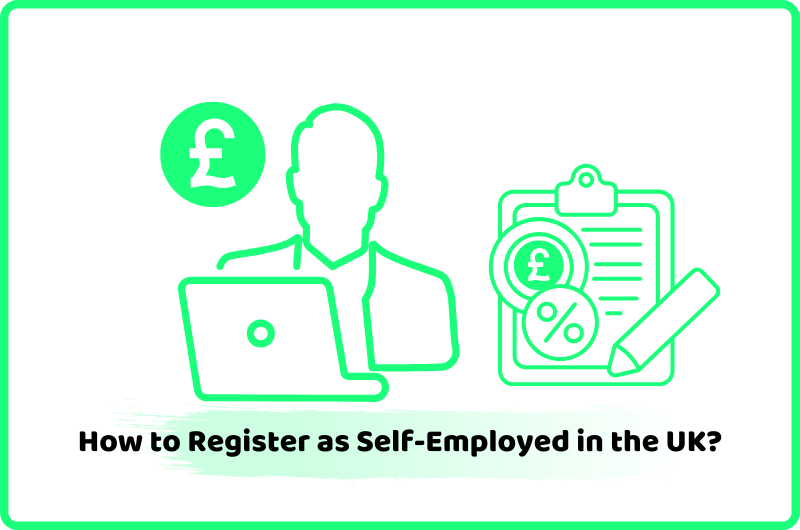How to Register as Self-Employed in the UK?
The process of starting your journey as a self-employed person in the UK is exciting and a very important responsibility for you. The first step is registering yourself as self-employed according to HMRC requirements. This blog guide will walk you through the process of how to register as self-employed, who needs to register, deadlines, etc. All freelancers, as well as small business owners and contractors, require it. This process may confuse you, yet we are present to help you through it. People who use our service can focus on business development while experiencing reduced stress.
What Does It Mean to Be Self-Employed?
Self-employment requires working individually without receiving employment through a company. As a self-employed person, you need to take full responsibility for taxes and National Insurance payments and financial recordkeeping duties. Self-employed status applies to freelancers and contractors together with sole traders and owners of small businesses.
Why Do You Need to Register as Self-Employed?
All individuals earning outside traditional employment must notify HMRC for self-employment registration. Registering allows you to:
- You must pay your taxes along with your national insurance contributions in the correct amounts.
- The registration protects you from financial penalties issued by HMRC.
- You can claim your business expenses to decrease your tax burden.
- You can receive benefits from the government through the state pension and maternity allowance.
How to Register as Self-Employed?
The steps on how to register as self-employed in the UK should be followed to fulfil legal obligations and prevent administrative penalties.
1. Check If You Need to Register
If you earn more than £1,000 in a tax year from self-employment, you are required to register in HMRC. On the other hand, if you earn less, you may not need to, but the registration could still be beneficial.
2. Gather Required Information
Before starting your registration, you must ensure the following details:
- Full name and address
- National Insurance Number (NIN)
- Date of birth
- Business name
- Type of business activity
- Contact details
3. Register Online with HMRC
Self-employed individuals can register most easily on HMRC’s online platform.
- Visit the official webpage of HMRC.
- Users need to either sign in using their existing Government Gateway account or create a new one.
- Choose Register as self-employed from the options available under select self-assessment.
- Enter the necessary information before you can submit your self-employment application.
4. Receive Your Unique Taxpayer Reference (UTR)
Once you register in HMRC, the HMRC will send you a unique Taxpayer Reference(UTR) by post. This number is essential for filling out your self-assessment tax return.
5. Set Up Your National Insurance Payments
Self-employed workers need to pay both Class 2 and Class 4 National Insurance contributions to HM Revenue and Customs because their annual profit levels determine their payment responsibility.
- Individuals must pay Class 2 NICs when their annual profits reach more than £6,725.
- Individuals must pay Class 4 NICs when their annual profits reach more than £12,570.
You make these payments by using the Self Assessment system to determine and submit your tax return annually.
Reference link (https://www.gov.uk/national-insurance/national-insurance-classes)
6. File Your Self-Assessment Tax Return
Each year requires you to file only a self-assessment tax return to declare your self-employed income and expenses. The deadline for filling out the online form is 31 January, following the end of the year.
7. Keep Accurate Financial Records
Complete documentation of your business income, together with expenses, is a necessary requirement. Proper record management enables you to p[ay accurate taxes while claiming permitted costs.
Benefits of Being Self-Employed
- Flexibility: You easily maintain the freedom to set working schedules and select tasks for your business.
- Earning Potential: Your income as a self-employed person has no maximum limit since your earning potential depends on your work effort and client demand.
- Tax Deductions: Office expenses, travel costs and equipment purchases allow business owner to declare deductions, which ultimately decreases their tax obligation.
Common Mistakes to Avoid When Registering
- Missing the Registration Deadline: New business owners must register before the deadline of 5 October in the following tax year after start-up
- Incorrect Information: Check your information twice to avoid registration delays because inaccurate details lead to delays.
- Forgetting to Pay Taxes on Time: Late payment of taxes creates penalties for the taxpayer.
Need Help with Your Registration?
Our team provides expert support, which simplifies the entire registration process for how to register as self-employed. The team will manage and execute your entire registration process to meet HMRC guidelines without errors. We offer personal services and complete service for registration support to assist with all your needs. Contact us right now to begin your process.
Conclusion
The legal process of managing your business finances through self-employment in the UK requires a full comprehension of how to register as self-employed. The outlined process serves to protect your business from penalties so you can concentrate on company development. Registering with HMRC today is your first step to start your self-employment career while assuming command of your monetary future.
Get in touch with our young, clever, and tech-driven professionals if you want to choose the solution to tax burden or accounting problems in the UK for your income. We will ensure to offer the best services.


